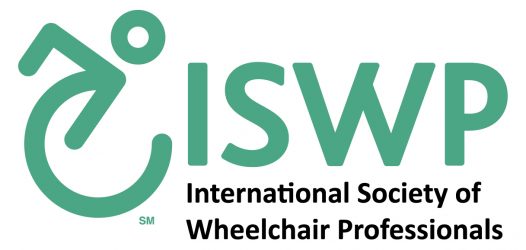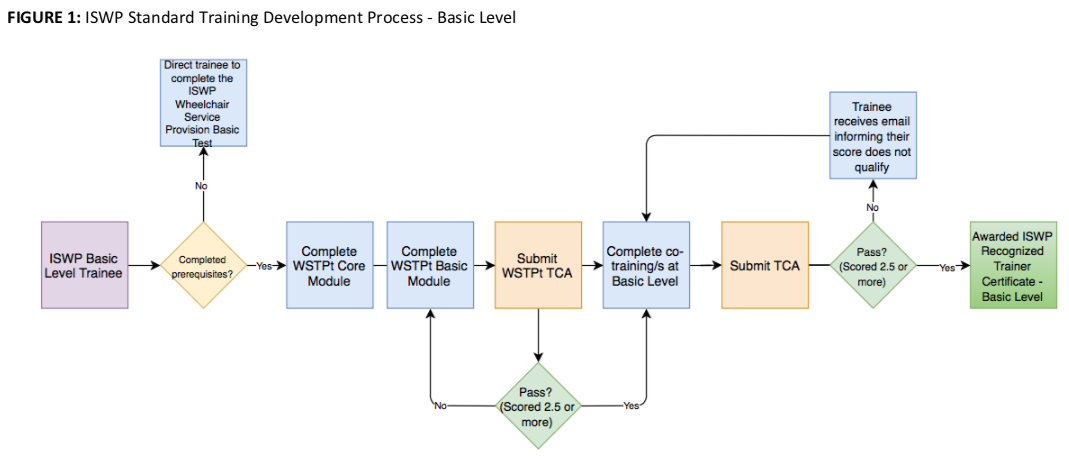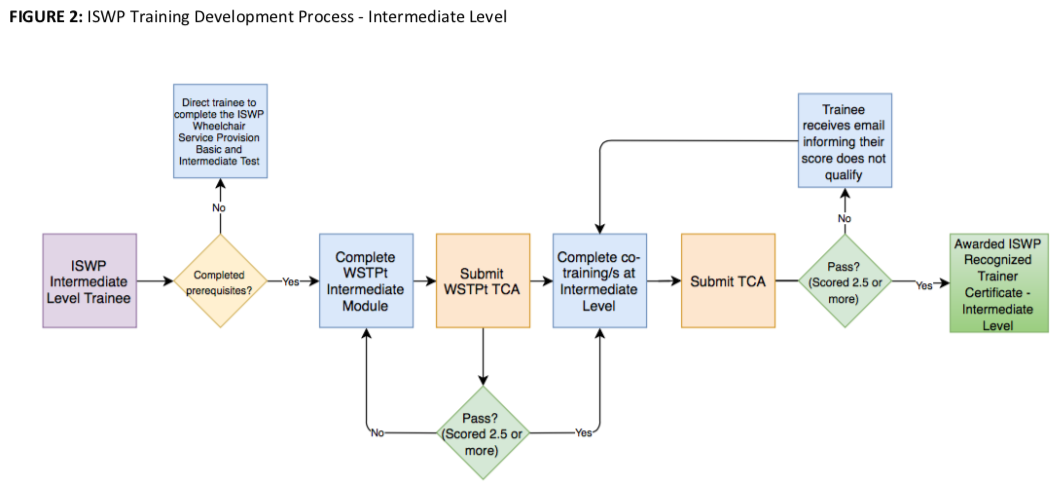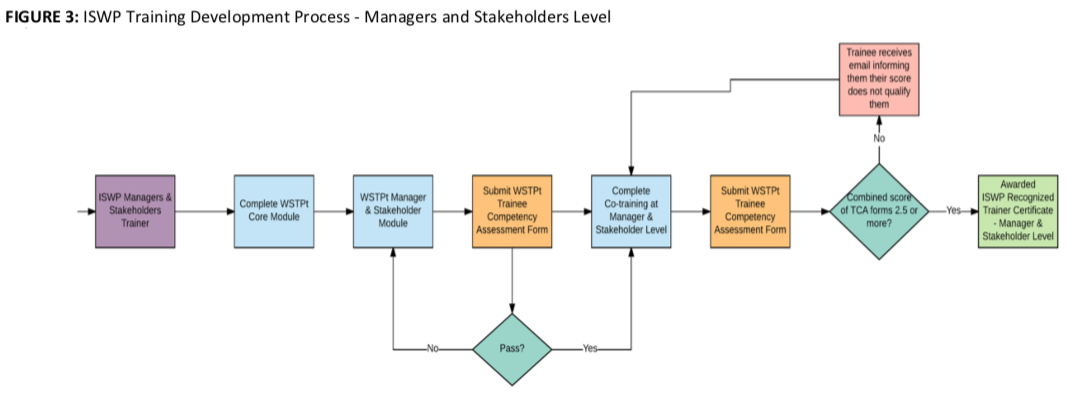The training pathway inlcudes courses and tests on wheelchair service proficiency which complement the World Health Organization (WHO) Wheelchair Service Training Packages.
The pathway includes opportunities for the following certificates and certifications:
- ISWP Wheelchair Service Provision Basic Level Certificate
- ISWP Wheelchair Service Provision Intermediate Level Certificate
- ISWP Trainer Recognition Certificate (Basic, Intermediate and Managers and Stakeholders)
ISWP Wheelchair Service Provision Basic Level Certificate
Background: The Wheelchair Service Provision Basic Test, based on the WHO Wheelchair Service Training Package – Basic Level (WSTP-b) and other evidence-based resources, is an assessment that measures the knowledge of wheelchair service providers at the basic level. The test consists of 75 multiple choice questions, takes approximately 75 minutes to complete and covers the domains of assessment, prescription, fitting, production, user training, process, and follow up maintenance and repair. Test takers who score 70% are eligible to proceed with the ISWP Wheelchair Service Provider (WSP) Certification. The basic test currently is no cost and available in Arabic, Albanian, English, French, Hindi, Khmer, Lao, Mandarin, Romanian, Russian, Portuguese, Spanish, Urdu and Vietnamese.
Intended Users: This test is intended for all clinicians, technicians, students and community workers who are fully or partly involved in the wheelchair sector.
- Need help? Watch instructional video in English and Spanish.
- Unable to complete the test online due to internet issues? Please contact [email protected] for the paper-based test option.
- Take the ISWP Basic Pre-Test Assessment
This is an optional pre-test assessment to help you prepare for the ISWP Wheelchair Service Provision Basic Knowledge Test. This is an optional course which will help you prepare for the ISWP Wheelchair Service Provision Basic Test. This course includes the following lessons: fundamentals of wheelchair service provision, wheelchair preparation, wheelchair fitting, Maintenance, repair and follow-up services and a prep-course case study.
To help you prepare, we recommend that you also familiarize yourself with the WHO Wheelchair Service Training Package – Basic Level (WSTP-b) training package before attempting the ISWP Wheelchair Service Provision Basic Knowledge Test.
Take the ISWP Wheelchair Service Provision Basic Knowledge Test
ISWP Wheelchair Service Provision Intermediate Level Certificate
Background: The Wheelchair Service Provision Intermediate Test, based on the WHO Wheelchair Service Training Package – Intermediate Level (WSTP-i) and other evidence-based resources, is designed to test the knowledge of personnel who provide manual wheelchairs and cushions for children and adults who need additional postural support to sit upright.
Intended users: It is intended for all clinicians, technicians, students and community workers who are partly or fully involved in the wheelchair service provision at the intermediate level as defined by the WHO.
This exam has two parts: Part 1 is the online knowledge test and Part 2 is the skills test. Participants who pass both components of the exam — online knowledge test and skills test — will receive a certificate of competency for intermediate wheelchair service provision.
Pre-Requisites:
- Participants should have attended or familiarized themselves with the WHO Wheelchair Service Training Package – Intermediate Level (link) before taking the test.
- The WHO Wheelchair Service Training Package – Intermediate Level includes foundational principles applicable to all contexts and service.
HIGHLY RECOMMENDED
- For candidates to have the best chance of passing the skills test, it is recommended that they work in wheelchair services after taking the training and apply their skills with a variety of users with different conditions and needs related to postural support devices. If possible, this should be done under supervision of a more experienced provider – either through direct or remote mentoring support, as well as additional focused training activities.
Part 1: Knowledge Test
An online exam with 91 multiple choice questions and 24 demographic questions (non-graded) with 70% as the pass score. Participants who score 70% and above in the knowledge test will be notified by e-mail to take Part 2, the skills portion of the test. int(2046)
Part 2: Skills Test
- A skills test requires submission of two case studies.
- If you score 70% in part 1 of the test, you will receive an email from ISWP requesting you to submit case studies. Please contact Krithika Kandavel at [email protected] if you don’t receive further information within 7 business days.
- Participants will have to secure 70% on each case study to pass the skills test.
Case Study Forms and Examples
All Case Study Forms
All Case Study Examples
ISWP Trainer Recognition Certificate
Background: The ISWP Trainer Recognition Certificate is available in 3 different levels: Basic, Intermediate and Managers and Stakeholders. This certificate recognizes trainers who completed the WHO WSTP Training of Trainers (WSTPtot) or a similar process. You can find more information here: http://dev.wheelchairnetwork.org/wp-content/uploads/2019/05/ISWP-Trainer-Development-Pathway-212.pdf
Intended Users: The trainer recognition certificate is intended for all clinicians, educators, mangers, technicians and community workers who have gone through the WHO WSTP Training of Trainers (WSTPtot) and/or have multiple years of experience teaching wheelchair service provision in line with the WHO WSTP Training of Trainers (WSTPtot) materials.
Trainee/co-trainee Competency Assessment (TCA) Form: The TCA is used to assess the competency and skill of new WSTP trainers in leading WSTP trainings at different levels. It is based on 8 competencies (should we list?) The tool, which uses a 3-point scale (describe the scale), was developed in concert with the WHO WSTPt materials and validated by an expert panel of 9 individuals from 5 different countries. A paper describing the development of the program is available: here
-
If you went through the WHO WSTP Training of Trainers (ToT) – Basic Level training then submit the following supporting documents (either through this link or send to Krithika Kandavel at [email protected]):
– TCA from WHO WSTP ToT -Basic Level
– TCA from co-training/s at the basic level
-
If you did not go through the WHO WSTP ToT – Basic Level training, submit the following supporting documents (either through this link or send to Krithika Kandavel at [email protected]):
– Provide evidence of leading basic level trainings – topics covered, how many were trained, etc.
– Provide wheelchair service provision certificates/degrees.
– Latest resume
-
If you went through the WHO WSTP Training of Trainers (ToT) – Intermediate Level training then submit the following supporting documents (either through this link or send to Krithika Kandavel at [email protected]):
- – TCA from WHO WSTP ToT – Intermediate Level- TCA from co-training/s at the Intermediate level
-
If you did not go through the WHO WSTP ToT – Intermediate Level training, submit the following supporting documents (either through this link or send to Krithika Kandavel at [email protected]):
– Provide evidence of leading intermediate level trainings – topics covered, how many were trained, etc.
– Provide wheelchair service provision certificates/degrees.
– Latest resume
-
If you went through the WHO WSTP Training of Trainers (ToT) – Managers and Stakeholders Level training then submit the following supporting documents (either through this link or send to Krithika Kandavel at [email protected]):
-
- – TCA from WHO WSTP ToT – Managers and Stakeholders Level- TCA from co-training/s at the Managers and Stakeholders Level
-
If you did not go through the WHO WSTP ToT – Managers and Stakeholders Level training, submit the following supporting documents (either through this link or send to Krithika Kandavel at [email protected]):
- – Provide evidence of leading Managers and Stakeholders Level level trainings – topics covered, how many were trained, etc. – Provide wheelchair service provision certificates/degrees. – Latest resume




